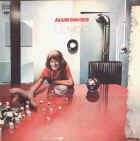
Rolling Stone Magazine
Issue 122 November 23 1972
- Daydo
Alun Davies
Columbia KC 31469
BY STEPHEN HOLDEN
If Cat is the crown
prince of British folkiedom, Alun Davies ("Daydo" was his childhood nickname)
could be the next heir apparent, though I would cast my personal vote for John Martyn or
Nick Drake. Davies' musical associations before Cat include roadwork with Jon Mark, Jeremy
Taylor, and Spencer Davis, and the formation with Mark of a short-lived
band, Sweet Thursday. Daydo was co-produced by Cat and Paul
Samwell-Smith (producer of Catch Bull and has Cat sitting in on piano.
Obviously, a lot of brotherly love brought this album into being, for its spirit is
remarkably buoyant. Its overall sound is, predictably, somewhat similar to that
of Cat's albums, though Davies is no carbon copy of his mentor. Vocally
he is less up front; he has a fairly light tenor voice (with a noticeable
accent) that is capable of a handsome range of expression.
Of the album's ten cuts
seven are authored or co-authored by Davies. The other three include a very good,
high-spirited rendition of Buddy Holly's "I'm Gonna Love You Too";
a lovely banjo-laced interpretation of Cat Stevens’ and Kim Fowley’s
"Portobello Road" (a song from Cat’s early days); and, of all
things, a rockin’ "I'm Late," the White Rabbit’s song from
Disney’s Alice In Wonderland. Davies’ own songs have some
of - the same quality as those on Cat’s Teaser —simple, repetitive
melodies with basic harmonic modulations—though they are not
quite as strong. "Waste of Time," the album’s biggest production number,
has almost a David Bowie-like theatricality, as Davies proclaims:
"Turn on a light, let the light shine in your room/Turn on a light, sort
out the light from the gloom." Another musical highlight
is the hauntingly resonant ballad "Market Place." Del
Newman’s arrangements are rich and varied; quiet choral backups appear and
disappear; textures are alternately chiming and visceral. It is all veddy
veddy British and indicative of the mystic-exotic trend within today’s London
acoustic scene.
Though this trend exerts a
strong influence on Davies’ especially the lyrics, he runs afoul of it
only once, on the album's longest cut, "Vale of Tears," a ballad that is
musically lovely but freighted with the purplest of purple arcana: "Cleopatra and
Joan of Arc, Guinevere holding a shell to my ear/Like trailing root finds rain in the sand
I found you/Like hammered bell ringing out in the land would sound you." This kind of
mythic romanticism, so profoundly escapist, has been a significant lyric motif for British
folkies beginning with Donovan. Its closest American counter-part is the bucolic
communal idea expressed by the likes of John Denver. But while the latter myth has at
least some vital currency, the insistency with which British folkies (including Cat
Stevens, to an extent) look back with longing at Pre-Raphaelite costumed fantasy seems to
me extremely self-indulgent and provincial, and ultimately decadent in the most fey
and trivial sense.
Lyrically, Davies is most
interesting when he writes about people, places, and things. The album’s best
narrative song, "Abram Brown Continued," is the eulogy-portrait of a
robust English type: "Abram’s cap falls over his eyes as he
scratches his head/Down at the stone where he sharpens his knife/ He likes to
talk and think of his life/ There's things he won’t ever tell to his
wife/ So he tells me instead." The body of the song is prefaced with a short
choral round: "Old Abram Brown is dead and gone you won’t see
him no more/He used to wear a long brown coat that buttoned up before."
Equally engaging are "Old Bourbon," a sentimental genre piece about wanting to
shelter an emaciated stray dog on a rainy night; and "Poor Street," a
succinct sad comment about growing up poor and staying that ‘way. I hope
that Davies isn’t poor, if he is, he shouldn’t stay that way for
long.
Review courtesy of Linda
Crafar
|